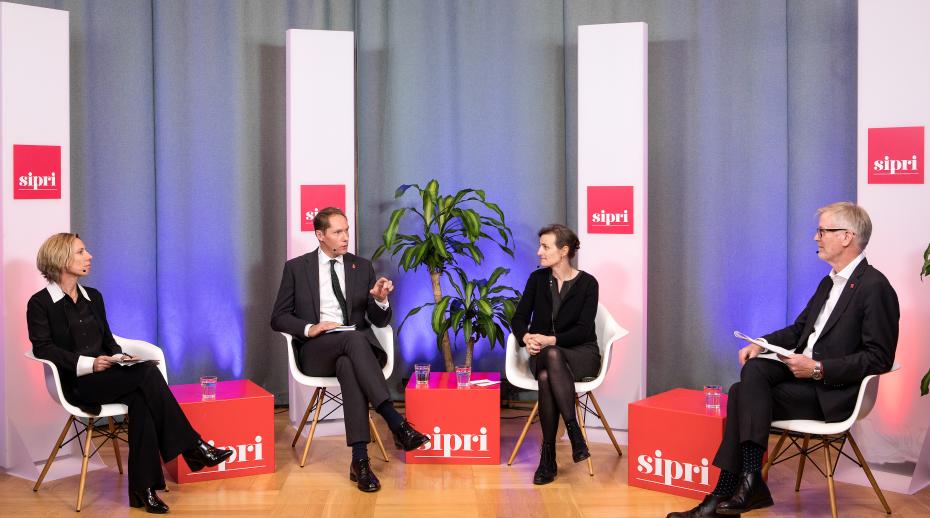
(Stockholm, 8 November 2021) Over the next four days, more than 1000 global participants will convene in a virtual space for the sixth annual Stockholm Security Conference. Watch today’s opening panel here and download the conference agenda here (PDF).
This year’s conference centres on the topic ‘Battlefields of the Future: Trends of Conflict and Warfare in the 21st Century’.
The thematic sessions will explore how current developments in technology have opened cyberspace, outer space and the mental space as potential new battlefields of the future.
Major General Darrell Amison, Director of the United Kingdom’s Development, Concepts and Doctrine Centre, provided an overview of the main drivers of insecurity. Drivers include geopolitical and geoeconomic shifts, data vulnerability and the pervasiveness of information, and the growth and concentration of populations. Transnational threats, the rise of non-state actors, violent extremism and organized crime are also among the main drivers. He also pointed to climate change and sustainability as cross-cutting, amplifying threats that interact with one another. ‘We need to think of societal resilience in a much broader sense than simply defence resilience,’ said Amison.
Dr Cordula Droege, Chief Legal Officer and Head of the Legal Division of the International Committee of the Red Cross, spoke about ongoing urbanization and conflicts fought in cities and in middle-income countries. She called for states to take more preventative measures to protect civilians. She emphasized the link between the new technologies of warfare and the vulnerabilities of populations and how, in cities, more advanced technologies exacerbate implications for critical infrastructure.
Dr Renata Dwan, Deputy Director and Senior Executive Officer of Chatham House, drew attention to the fact that ‘technologies have not changed why we fight but have changed the way we fight.’ The destructiveness of war currently being witnessed is faster, centres on precision, accuracy, sustainability and connectivity. There is a new trend that measures technology not only in destructiveness but also with information as a weapon. Looking forward, she pointed towards the need to understand the convergence of technologies, ‘when nuclear meets cyber’, as well as the worrying trend of non-state actors being able to access more of these technologies as they become cheaper.
‘We can take seriously the importance of not racing to technology, we can take seriously the need for new ideas,’ said Dan Smith, SIPRI Director, during the concluding remarks. ‘We need to think about the intersection of issues outside the security domain’ and, most importantly, we need to apply a human dimension when dealing with complex battlefields.
Browse the 2021 conference programme here and register for the thematic sessions.
About SIPRI and the Stockholm Security Conference
Held annually, the Stockholm Security Conference brings together key stakeholders to discuss global security challenges and how to respond to insecurity. The conference gathers leading global representatives from the political, academic and business worlds, as well as civil society, in a joint endeavour to explore the multiple dimensions of security in the world. It has been hosted by the Stockholm International Peace Research Institute since 2016.
SIPRI is an independent international institute dedicated to research into conflict, armaments, arms control and disarmament. Established in 1966, SIPRI provides data, analysis and recommendations based on open sources.
For editors
For media requests, please contact Alexandra Manolache, SIPRI Communications Officer, alexandra.manolache@sipri.org, +46 76 628 61 33.
Photos and videos from the event will be made available on SIPRI’s website. Follow @SIPRIorg on Twitter and follow the conference with #SthlmSecCon.